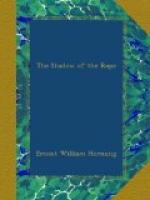“A detective, no!” said she, readily enough. “But you are a rich man; you could employ detectives; you could clear your wife, if you liked.”
“Rachel, you know very well that you are cleared already.”
“That is your answer, then!” she cried scornfully, and snatched her eyes from him at last, without waiting for a denial. She was done with him, her face said plainly; he looked at her a moment, then turned aside with a shrug.
But Rachel’s eyes went swiftly round the room; they alighted for an instant upon Morna Woodgate, leaning forward upon the sofa where they had sat together, eager, enthusiastic, but impotent as a woman must be; they passed over the vicar, looking stolid as usual, and more than a little puzzled; but at last they rested on Langholm’s thin, stooping figure, with untidy head thrust forward towards her, and a light in his dreamy eyes that kindled a new light in her own.
“You, Mr. Langholm!” cried Rachel, taking a quick, short step in his direction. “You, with your plots and your problems that nobody can solve; don’t you think you could unravel this one for me?”
Her eyes were radiant now, and their radiance all for him. Langholm felt the heart swimming in his body, the brain in his head. A couple of long-legged strides to meet her nine-tenths of the way, and he had taken Rachel’s hand before her husband and her friends.
“Before God,” said Langholm, “I’ll try!”
Their hands met only to part. There was a sardonic laugh from Rachel’s husband.
“Do you forbid me?” demanded Langholm, turning upon him.
“Far from it,” said Steel. “I shall be most interested to see you go to work.”
“Is that a challenge?”
The two men faced each other, while the third man and the women looked on. It had sounded like a challenge to all but the vicar, though neither of the others had had time to think so before they heard the word and recognized its justice.
“If you like,” said Steel, indifferently.
“I accept it as such,” rejoined Langholm, dogging the other with his eyes. “And find him I will—the guilty man—if I never write another line—and if the villain is still alive!”
CHAPTER XX
MORE HASTE
There are eminent men of action who can acquit themselves with equal credit upon the little field of letters, as some of the very best books of late years go to prove. The man of letters, on the other hand, capable of cutting a respectable figure in action, is, one fears, a much rarer type. Langholm was essentially a man of letters. He was at his best among his roses and his books, at his worst in unforeseen collision with the rougher realities of life. But give him time, and he was not the man to run away because his equipment for battle was as short as his confidence in himself; and perhaps such courage as he possessed was not less courageous for the crust




